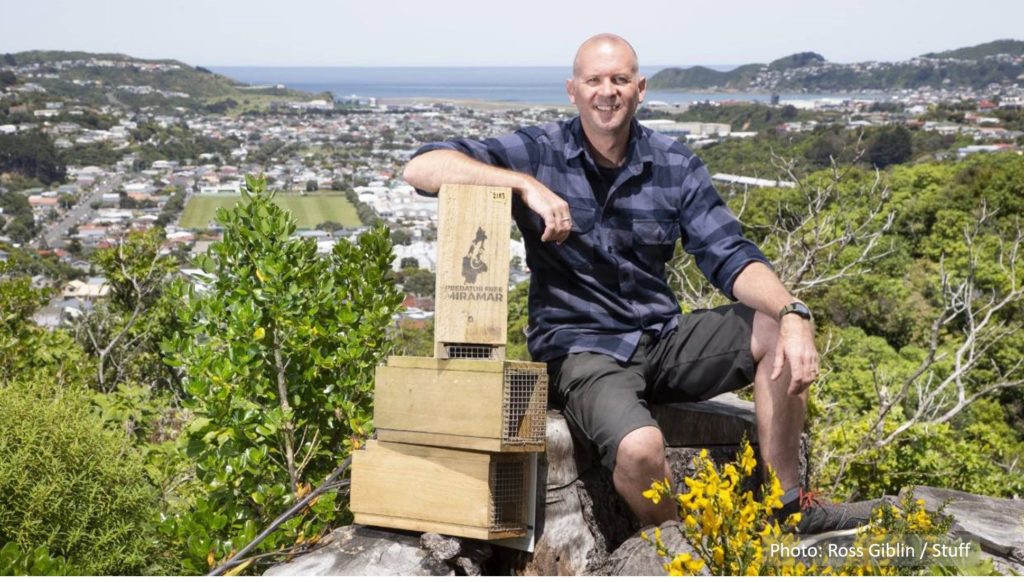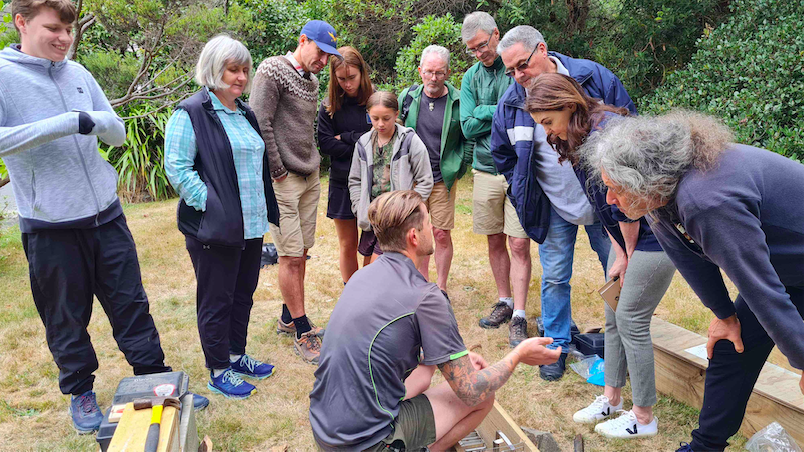In 2017, Dan Henry, together with some friends, set up Predator Free Miramar and encouraged the community to start backyard trapping in an effort to rid the suburb of rats and other introduced predators, and bring back the birds to Wellington’s eastern suburbs.

Four years on, they’ve created a community made up of over 1000 households that have caught a whopping 10,000 introduced predators.
Miramar residents are now spotting kākā and kākāriki flying over their suburb and Predator Free Miramar are on to their last few rats. Once they’re caught, this group will have to remain vigilant to protect their predator free suburban safe haven.
Dan has recorded the story of Predator Free Miramar in a resource called ‘How to kill rats and engage a community‘ (PDF, 8MB), which outlines the steps they took along the way. “It’s not a blue-print, because there’s not one right way of doing it,” he says, “But hopefully there are a few tips in there for other groups.
We asked Dan, what is special about Predator Free Miramar?
“In just four years, Predator Free Miramar has grown from being a handful of keen backyard trappers to a united community of thousands, hugely motivated to drive the last rats from the peninsula and make it a haven for native birds. This is a project that truly belongs to the people. We have backyard traps in more than a thousand households – all managed by those individuals or families – and we have a growing army of committed locals who meet up every Sunday to clear traps around the coast or in our bush reserves.
We’re fortunate to have Predator Free Wellington running the eradication here on the Miramar Peninsula too. This has increased the visibility of the broader predator free kaupapa and strengthened the resolve of our community to see this project through to completion. There’s a real sense of pride among Miramartians about our local birdlife, our beaches, bush and backyards – and all of the people working together to protect them.“
Why did you get involved in conservation?
“I’ve always enjoyed the outdoors – I enjoyed tramping as a teenager and have returned to it in recent years. When we moved to Miramar in 2005, we were lucky to find a home which bordered a reserve with regenerating native bush and one of the peninsula’s hidden gems of a stream. It’s a great place to take a walk and find some urban wilderness. A ten-minute walk from our house takes me up through the bush and onto the incredible headland north of the old Wellington Prison. This area is one of Wellington’s absolute treasures that should be preserved forever.
Spending time in the reserve, I soon ran into Joakim Liman who’d established Te Motu Kairangi Ecological Restoration Group, and I worked with him to grow the trapping programme. And then in 2015, 2016 Kelvin Hastie was achieving great things with Crofton Downs Predator Free Community, and the national vision for a Predator Free New Zealand by 2050 was announced. I was keen to widen the scope of what we were in our own neighbourhood, so got together with a friend and established Predator Free Miramar. “
What benefits have you seen from people getting involved in local conservation projects like Predator Free Miramar?
‘It’s been hugely positive for the community. Globally and more locally, the last few years have been tumultuous in so many ways, generally with things beyond our own control. But backyard trapping is fantastic because you can make such a difference without leaving home, and you can measure your own success and see the benefits. There are the obvious benefits to wildlife, where you remove a rat and that will help birds and lizards flourish. But people also enjoy getting exercise and fresh air from checking a trap line; making new friends – both online and face to face in weekly meet-up sessions; and simply being part of something – contributing to something bigger.

Studies have been published about the increased positive mental well-being that is reported by those who partake in backyard trapping. So there’s science to back up what we all already know here in Miramar!”
How can people support Predator Free Miramar?
“We are very close to nailing the last few rats on Miramar Peninsula. They’ve proved tough adversaries, but we have a motivated community who are not giving up any time soon. So we’ll give out a backyard trap to anyone who hasn’t yet got one. And we’d love to hear from anyone keen to take on a trap line around the coast or in a reserve. Once we’ve caught the last few rats, the price we’ll pay for being Predator Free is eternal vigilance – which means we’ll need to be constantly monitoring for reinvasion. We have to be ready to pounce at the first sign of any rat incursion.
Other ways people can help are by planting bird-friendly habitats in their backyards and by changing those old habits of throwing out bread for the birds. That bread just attracts rats and mice, so we all need to adjust our behaviour. And finally, this is not just about Miramar, but our neighbouring suburbs too. The more trapping we can get happening across the wider Wellington city, the harder it’ll be for rats to reinvade Miramar! So tell your friends!

